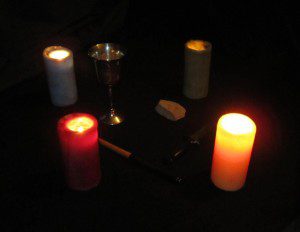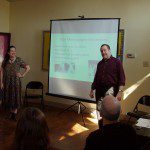 One of John Halstead’s centers of Paganism is the Self. John has found it challenging to precisely communicate what this does and doesn’t mean, since the very term “Self-centered” leads many people to incorrectly assume it means “ego-centered.” But as soon as I read it, I understood what he was talking about. Perfecting (or improving) yourself has been the goal of mystery religions at least since the Eleusinian Mysteries. Witchcraft is traditionally the tool of those without access to mainstream power structures. And there’s my favorite subtitle of all time, Lon Milo DuQuette’s “it’s all in your head … you just have no idea how big your head is.”
One of John Halstead’s centers of Paganism is the Self. John has found it challenging to precisely communicate what this does and doesn’t mean, since the very term “Self-centered” leads many people to incorrectly assume it means “ego-centered.” But as soon as I read it, I understood what he was talking about. Perfecting (or improving) yourself has been the goal of mystery religions at least since the Eleusinian Mysteries. Witchcraft is traditionally the tool of those without access to mainstream power structures. And there’s my favorite subtitle of all time, Lon Milo DuQuette’s “it’s all in your head … you just have no idea how big your head is.”
Nature and the gods are the primary centers of my own Paganism. But the elements of Self-centered Paganism are important too.
I don’t like calling them Self-centered or Self-centric, and I don’t like talking about them in terms of self-improvement. I know it’s helpful to some people, but I spent much of my young adulthood working on self-improvement and it was a miserable failure. Part of that failure was depression and part of it was chasing the wrong things, but the biggest reason self-improvement was a failure was that the idea of “getting better” wasn’t enough for me. Get better? Get better for what?
Nature and the gods answer the “for what?” question for me. I want to improve myself so I can better connect with them, better work with them and better work for them. For me, this center isn’t a commitment to myself for myself. It’s a commitment to excellence, a commitment to learning and growing so I can be of greater service. This is what that commitment means to me.
A commitment to excellence is a commitment to myth. Nobel prize-winning author Thomas Mann said “a myth is a story about the way things never were but always are.” In his song “Pagan Ways” Damh the Bard tells us “the truth is held within a tale.” Our ancestors understood the power of stories. The Enlightenment was a great positive step in Western civilization, but one of its side effects was a loss of myth. If even the movements of the heavens could be explained rationally, then there must be a rational explanation for everything. And by extension, if there was no rational explanation for something, then it was worthless.
The loss of mythical thinking is one of the causes of Christian fundamentalism. If rational, literal truth is the only truth, then the Bible is either literally true or it is worthless. The idea that it could be mythically true is never considered.
A commitment to myth means reading the stories of our ancestors, not just to tease out facts about how they lived and how they worshipped their gods, but to let the stories work their magic on us. It means meditating on them, learning the values and virtues they teach, and then reinterpreting and reimagining them for our lives here and now.
A commitment to myth is a search for wisdom, not just information.
A commitment to excellence is a commitment to mysticism. At its core, mysticism is direct experience of the Divine. It can be a religious rite such as the Wiccan Drawing Down the Moon. It can be the ecstatic state that comes through dancing and drumming. It can be the serenity that comes through mindful meditation, or the experience of wonder and awe that comes from places of power and beauty in the natural world.
And sometimes, mystical experiences barge in when you least expect them and you get an unexpected vision or visitation or dream that leaves you wondering what it means but with no doubt that it is very important.
My few but powerful mystical experiences have given me confirmation of my callings. They were powerful enough to crowd out the fears the fundamentalism of my youth had planted deep in my brain. They are like wine: delicious and intoxicating. In small quantities they are helpful and healthy. In larger quantities they can make it difficult for you to function in the mainstream world.
I can’t tell you about many of my mystical experiences because words cannot adequately describe them. I can only point you in that direction – what you experience is up to you and your gods.
A commitment to excellence is a commitment to know yourself. On the famous Temple of Apollo at Delphi were carved the words gnōthi seautón: know thyself. As I mentioned above, one of my greatest sources of trouble in my younger years was chasing the wrong things. Instead of working toward what I wanted, I was working toward what I thought I was supposed to want: material wealth and the power it brings. As any money management guru will tell you, everybody wants to be rich, but very few people want to do what it takes to get rich. Very few people have a single-minded obsession with making (and keeping!) money – I’m not one of them. I couldn’t understand why I wasn’t happy working 60 or 80 or 100 hours a week making money, and I didn’t want to accept that I didn’t really agree with the mainstream society’s idea of “success.”
I had to learn that when it comes to material things, I wanted enough. Once I had enough, more wouldn’t make me any happier, so deep down I had no motivation to work for more.
When I accepted that what I really wanted was a deep connection to Nature and to the Divine, I started making real progress on my spiritual journey.
Knowing yourself isn’t just about knowing what you want. It’s also knowing who you are and whose you are. It’s understanding why you do what you do and why you feel what you feel. It’s developing the mindfulness to notice when you’re behaving in ways that are out of alignment with your values, and the understanding of what will bring you back to your true self.
A commitment to excellence is a commitment to practice. I still occasionally come across people who say things like “a witch is born, not made.” While some of us have more natural ability for certain activities than others, there is nothing under the Pagan umbrella that is restricted by genetics or bloodlines… and there is nothing that can’t be improved with practice.
Learning who you are is hard work. Staying in alignment with who you are is very hard work. Studying myths isn’t easy. Mystical experiences come on their own timetables, but they come far more regularly when you work at them.
According to the schedule on his website, the Dalai Lama spends about six hours a day in meditation, prayer and study.
A commitment to excellence is a commitment to change. One of the classic definitions of magic is “the art and science of causing change in accordance with Will.” In my early days experimenting with magic, I was overly concerned with the “how” of magic and not concerned enough with the “what” and the “why.” I just wanted to do something. I learned fairly quickly – the hard way – when not to work magic. It took a lot longer to learn what it was really for: to change myself, and in doing so, to change the world.
Start a daily spiritual practice and the parts of yourself you like to keep hidden may start to come out. Your ego may feel threatened – spiritual practice can be a threat to your sense of self-importance and self-righteousness. It may challenge what you believe, how you treat other people, and how you treat yourself. It may challenge you to change the way you live.
What, you thought this was going to be easy?
A commitment to excellence is not easy. If you’re looking for easy, there are any number of religions, spiritualities or entertainments that will be happy to feed you spiritual opium. But I can’t do justice to my commitment to Nature and to the gods without a commitment to excellence in my spiritual life.

















